|
Jon Isaacson's best-selling book How To Suck Less At Estimating: Habits For Better Project Outcomes has been adapted into an internet course that is now available through Restoration Technical Institute. Jon Isaacson hit the nail right on the head again with this one. So many tips for both "seasoned" and new estimating professionals. I thoroughly enjoy the fact that in all his books I find myself totally relating to his scenarios. Keep it up Jon! I cannot wait to see what books are to come.” - Lisa Atkins, reviewing the book Construction Estimating CourseFeatures of the How To Suck Less At Estimating course:
Unlike any course you have ever taken before. If you like to be overstimulated, to learn, and estimating, this is the course for you! Jon Isaacson delivers practical knowledge and demonstrations in his signature "INFOtainment" style." - RTI course description Insurance Claims Estimating CourseHow to Suck Less At Estimating by Jon Isaacson Description: Interactive eLearning Course Duration: 6 Hours The Six Modules of Habits For Better Project Outcomes:
LEARN MORE and register for this course at Restoration Technical Institute
0 Comments
ANNOUNCEMENT: On Monday, January 23, 2023, the night before the Andrew Ask Building Science Symposium (aka Winter Break 2023), The DYOJO and Pete Consigili will be hosting a Happy Hour like no other. This event is designed to build bridges between the OGs of property restoration, such as the Restoration Watchdogs Pete Consigli and Cliff Zlotnik, together with the New Gs. We are calling it The Watchdog Neighborhood (aka The Cardigan Party) as we intend to bring a Mr. Roger's vibe to kickoff parties for industry events from here-on-out.
JOIN US THE WEEK OF JANUARY 23, 2023
Have you ever lost a million dollars for a lack of water damage mitigation moisture readings? On The DYOJO Podcast Episode 92 & 93 we have been discussing a Texas contractor who is suing a local school district for underpayment of services rendered during Winter Storm Uri in 2021. The contractor valued their water damage dehumidification services at over $1.2 million dollars, the school district and their insurance company made an initial payment of less than $200,000. The customer stated that more would be paid if additional drying documentation was provided by the contractor. According to statements given to a local news station, the contractor says that this water damage mitigation daily documentation doesn't exist. The video below briefly introduces a commentary that friend of The DYOJO Podcast, Josh "IAQ Josh" Winton produced reviewing the essential elements of daily moisture mapping and documentation for a water damage event. Additional resources on this and related topics:
The DYOJO Podcast - helping contractors shorten their DANG learning curve. Thursdays are for The DYOJO Podcast. thedyojo.com/podcast ANNOUNCEMENT: On Thursday, January 26, 2023 The DYOJO and Pete Consigili, the Global Restoration Watchdog, will be hosting a workshop around Lessons Learned from Hurricane and Storm Response and Recovery. This event will include panel presentations for restoration, remediation, insurance claims, and hurricane response. The one-day workshop will follow the Andrew Ask Building Science Symposium (aka the Building Science Winter Break) at the same location two days prior. Stay tuned as more information will be coming soon, but the plan thus far includes presentations for this storm and hurricane response workshop from industry leaders such as:
Contact the DYOJO for more information as well as opportunities to sponsor this and upcoming events.
When a contractor sends an invoice, is there an obligation for the receiver to pay it? The real answer is, it depends. In this article, we will review two scenarios, one personal and another from a case that is currently in litigation. After reviewing both incidents, contractors should have a better understanding of some of the self-inflicted ways that their claims for proper payment of services rendered can be harmed. This content will also serve as a simple training resource to help your team members shorten their learning curve for understanding three critical questions for getting paid as a contractor. Three questions that will help contractors get paidOften our ability to get paid suffers from self-inflicted harm. Unfortunately, I had to learn this the hard way following a surprise freeze event that hit our local market in Eugene, Oregon. We were hired by a property manager (some contractors already know where this is going), they even signed our work authorization (potential nail in the coffin number two), we performed the work, they signed our certificate of completion, and were happy with our work. Case closed, right? What painful lesson did I have to learn? The property manager was not the owner of the property, nor were they authorized to sign contractual obligations on behalf of the owner, nor would they pay our invoice unless the owner agreed to release the funds to them or us directly. While it takes two to tango, the contractor has the most to lose so the contractor is responsible to protect themselves and their money. In this scenario, we failed to answer parts two (fully) and three (at all) of a critical sequence of questions for getting paid.
In my role as an estimator, there were some office politics and internal dynamics that made this situation more tenuous than it should have been. During the literal flood of freeze claims, I was covering the account of another project manager on our team. I was dispatching our team members based on third-hand verbal commitments. Several senior members in our office, including the general manager, my peer, and myself believed that since this was a large account in town, we could overlook certain processes. While it would have been good for our office to gain traction with their book of business our failure to complete the critical sequence of questions for getting paid made the process difficult. Stop ignoring red flags as a contractorIf this scenario sounds familiar, perhaps you have been listening to a story we have been sharing on The DYOJO Podcast about an Arlington Texas contractor. Robert Jordan Construction (RJC) claims they have not been paid for services rendered at Sam Houston High School following water damage from Winter Storm Uri in 2021. RJC believed they had answered question one but the customer, Arlington Independent School District (AISD), disagrees. The court documents ask critical questions that many contractors, including myself, must answer, such as, “Do a series of emails constitute a contract or agreement?” As we cover in the podcast, RJC performed a walk-through, stated a verbal scope of work, and proceeded with what they thought was authorization from the appropriate parties. RJC followed up with a (briefly) written proposal, the school district responded with requests for further information. Listen to these rebuttals from AISD and ask your team whether these should serve as warnings to review your processes and tighten up your contracts.
With regards to Question One, RJC proposed a scope of work and stated a price based upon a pricing structure, square footage pricing for water damage response and/or dehumidification. AISD states that the quantities, documentation, and pricing are inconsistent with the cost of work that they believe is appropriate. As for Question Two, it is documented that AISD appealed for more information as soon as they received the proposal from RJC as well as after they received the final invoice. Question Three should have been cause for teh contractor to take their foot off the gas as early into the process RJC was notified that no amount over $50,000 can be authorized without approval by the AISD board. RJC was notified of the date on which this issue would be brought before the board. The board did vote, “To authorize Superintendent or his designee to negotiate a contract - in contract with RJ Construction for emergency services and equipment necessary to perform moisture mitigation of district facilities not to exceed $1,245,600.00.” By this point of further payment ambiguity, the work had been completed. Learning from your mistakes as a contractorAs with my personal scenario, one could see RJC believing they are acting in good faith and trusting people on the other end to “do the right thing.” Yet, the red flags popped up early and appear to have been overlooked by the contractor. A few additional lessons many have had to learn, especially when working with governmental agencies, is to always assume that a third party will be called in to review the work. One of the many pieces we are still trying to put together in the podcast research is just how much documentation RJC did or did not provide the district. AISD appears to have asked for additional documentation early and in a much more directed manner after they consulted with their insurance carrier.
I shared some of my story on Episode 93 of The DYOJO Podcast as we continue to dig into the available information from the RJC vs. AISD case. If any of this resonates with you or your team, we would love to hear from you. Tune in on Thursdays and contact The DYOJO. The best-selling book, How To Suck Less At Estimating: Habits for Better Project Outcomes, by Jon Isaacson is NOW AVAILABLE as a six module training course from Restoration Technical Institute. Project outcomes in the skilled trades are tied to the estimating process. Good estimating is marked by the thoroughness of data capture (site observation) and the accuracy of data input (bidding). Author Jon Isaacson, The Intentional Restorer, shares his two decades of professional experience to help anyone involved with, or interested in, the art of estimating to shorten their DANG learning curve for improvement. Habits For Better Project Outcomes:
Included in your purchase:
Unlike any course you have ever taken before. If you like to be overstimulated, learn and estimating, this is the course for you! Jon Isaacson delivers practical knowledge and demonstrations in his signature "INFOtainment" style. How To Suck Less At Estimating, was written for:
Early Reviews for This Book:
|
Words
The DYOJO - helping contractors shorten Archives
June 2024
Categories
All
EstimatingMarketingInsurance ClaimsLeadership |
|
| |||||||



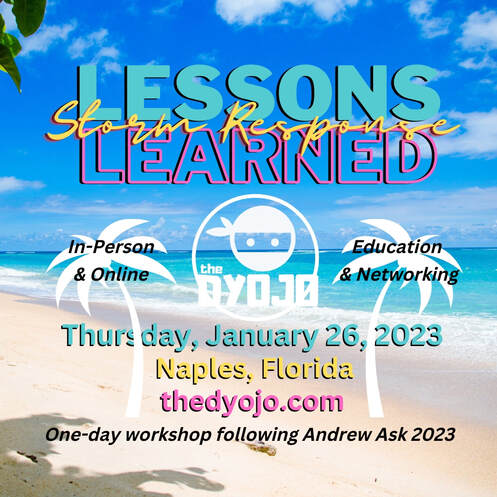
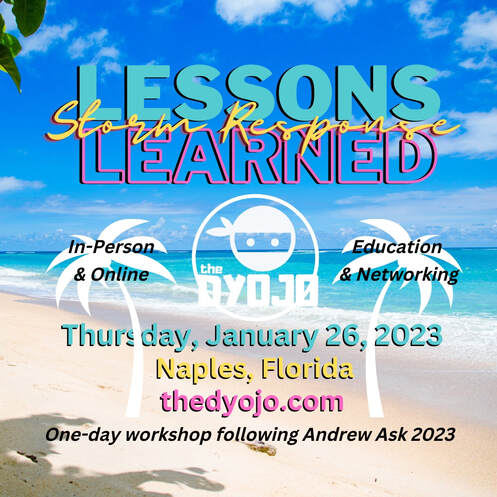
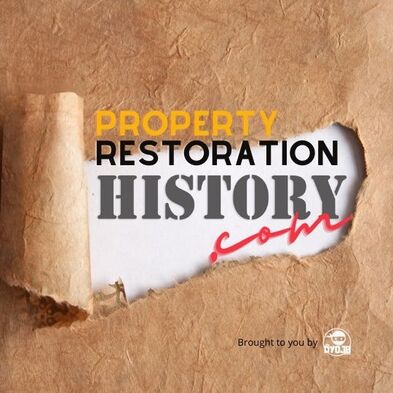
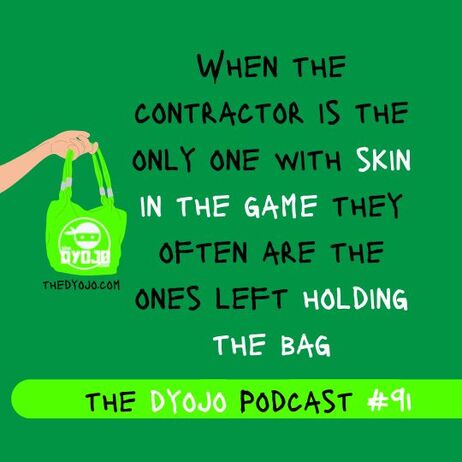
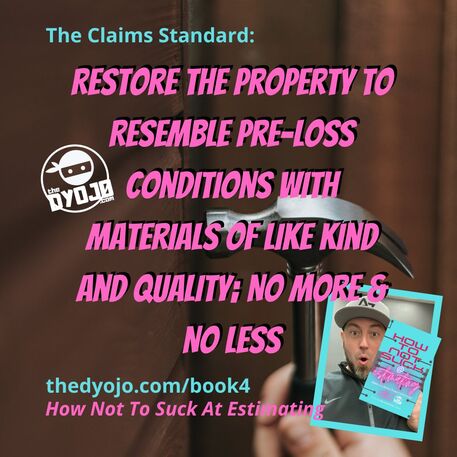
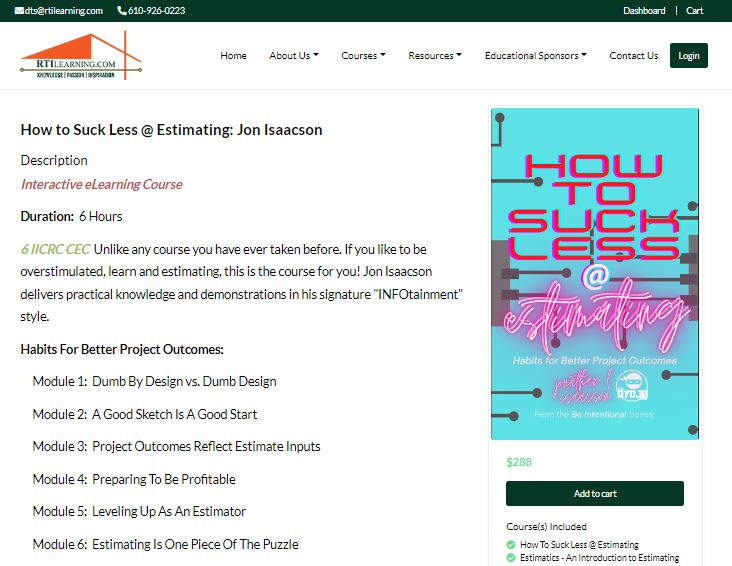

 RSS Feed
RSS Feed
